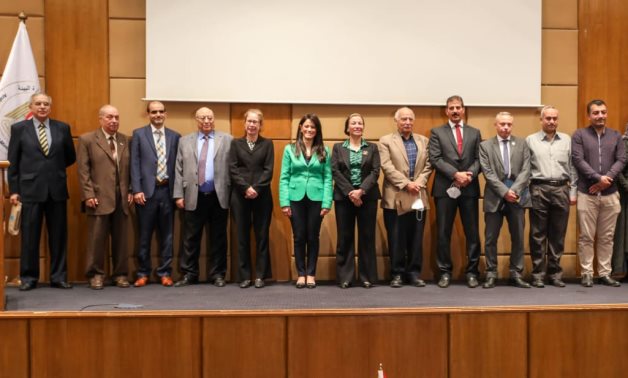
Egyptian and international officials posing for a photo in a ceremony held on April 10, 2022 to celebrate getting rid of 2,000 tons of Persistent Organic Pollutants. Press Photo
CAIRO – 10 April 2022: The Ministry of Environment announced Sunday the conclusion of the Sustainable Management of Persistent Organic Pollutants (PoPs) Project, which helped Egypt get rid of 1,000 tons of each of toxic pesticides, and oils contaminated with polychlorinated biphenyls (PCBs).
Minister Yasmin Fouad explained, during a ceremony held to celebrate such event, that samples of different pesticides were collected from many governorates designating those comprising toxins. Then, studies were carried out to examine the possibility of disposing of them through large cement factories, which was actually done later.
As for the oils contaminated with PCBs, which came from electricity transmission plants, they were detoxified and recycled, which has achieved a great economic return, given their high prices.
The minister clarified that scientific studies were conducted, after inspecting 13,000 electricity transmission plants nationwide, leading up to a decision to import two PCBs detoxification units.
Minister Fouad highlighted that the imported units are the most recent in the market as they have the ability to detoxify the oils without the need to shut down the transmission plants. They can also get rid of other types of toxins, and enjoy high degrees of safety.
It is noted that the project was funded by the Global Environment Facility with $8.1 million, and the World Bank Group's Pollution Management and Environmental Health Trust Fund (PMEH) with $750,000.
The environment minister similarly showcased that one of the big projects that are still underway is the improvement of air quality in Greater Cairo. More importantly, the ministry declared last week that the National Strategy for Climate Change addressing 17 aspects would be launched in a few days.
In COP 27 to be hosted by Egypt in Sharm El Sheikh next November, Egypt will present initiatives pertaining to water; agriculture; nutrition; relation between diets on one hand, and crops, health, modes of production and consumption on the other hand; management of coastal areas as an example of coexistence measures aimed at achieving sustainable life for local residents; blue economy; management of waste, particularly plastic; and, showcasing the value added derived from waste recycling in the form of green job opportunities, sustainable quality of life and formalization of the informal sector.
Egypt will also display success stories of climate projects executed in various locations. Those include small and medium enterprises as well as mega ones.
Fouad had stated that COP 27 will cover climate funding, dimensions of coexistence, priorities of developing countries, updated national contributions of states, goals, and experiences.
Comments
Leave a Comment